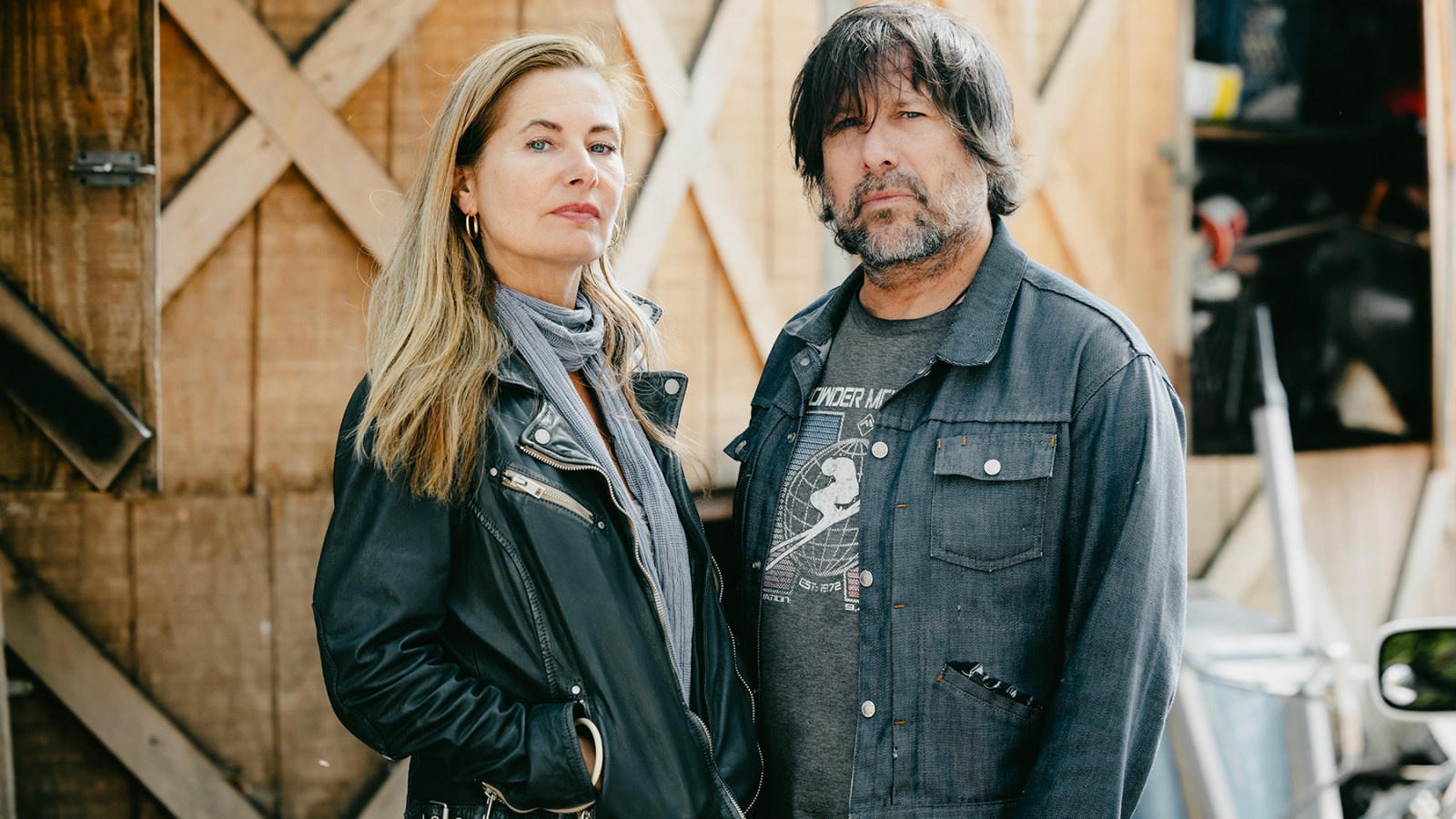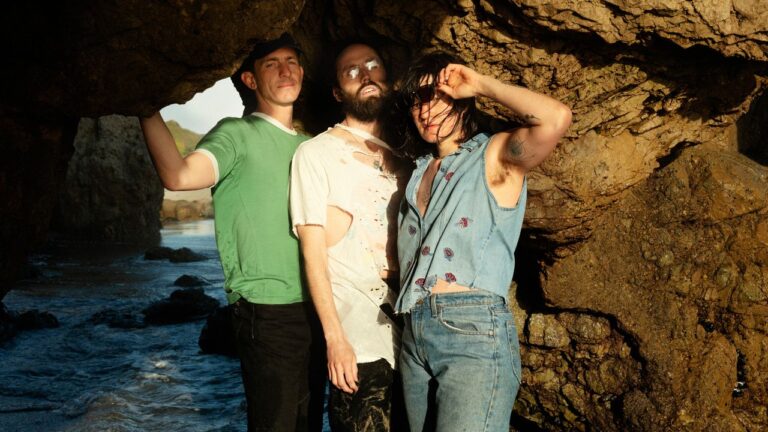Andy Chase and Dominique Durand needed to see what was left of their band. It was 2021, a decade after the last album they’d made with the acclaimed indie-pop group Ivy, and a year after the sudden, tragic death from Covid of the band’s third member, Adam Schlesinger. So Chase and Durand rented a car and drove from New York to Rhode Island, where they’d put all of Ivy’s archives into storage the previous year.
“She and I stood on ladders and stood on boxes,” Chase recalls. “We had everything from 24-track, two-inch reel-to-reel tapes to DAT tapes to hard drives. I mean, it was like a museum of the history of music recording.”
At the time, they were only hoping to uncover some bonus tracks for reissues of Ivy’s first three studio albums. What they found instead was a treasure trove of unfinished songs, demos, and sketches from throughout the band’s 18-year studio history. They spent the next two years completing and shaping the best of those songs into a new album with help from Bruce Driscoll, their former backing keyboardist and guitarist. Traces of You, out Sept. 5 through Bar/None Records, is an unexpected treat for any fan of Ivy’s stylish downtown sound — a pop time machine that takes you right back to where you were the first time you heard 1997’s “I’ve Got a Feeling” or 2000’s “Edge of the Ocean,” and reignites that spark in a way that feels just short of miraculous.
Schlesinger’s golden ear for melody and his impish sense of humor came through in everything he did, whether it was the music he made with his most successful band, Fountains of Wayne, or the songs he wrote for film and TV projects including That Thing You Do! and Crazy Ex-Girlfriend. His death at age 52, in the early weeks of the 2020 pandemic, shocked the music world and left his many, many friends and collaborators grieving. And it seemed certain to spell the end of Ivy, which he’d founded with Chase, a multi-instrumentalist like himself, and Durand, a Parisian singer, when they were all still unknowns.
When we meet in late June, the former couple at the heart of Ivy are sharing a sofa with Driscoll at the lobby bar of the Hotel Chelsea, just a few blocks away from where they lived in the late Nineties, and not far from the onetime location of Stratosphere Sound, the now-closed recording studio that Chase and Schlesinger ran with their friend James Iha of Smashing Pumpkins. Chase nurses a glass of Jameson on the rocks — his and Schlesinger’s favorite drink, he says — while Durand sips a latte.
Though they’ve been separated for many years, Durand and Chase remain close friends, and their fondness and respect for each other is clear when they reminisce about the old days (or talk about the family vacations they still go on together with their kids). They explain that Ivy’s hiatus starting in the early 2010s had less to do with the state of their marriage, and more to do with long-simmering conflicts between Chase and Schlesinger, who weren’t on speaking terms for much of the decade before Schlesinger’s death.
“Ivy never officially broke up, but I wanted to extricate myself as much as possible from Adam,” Chase says, recalling how he felt circa 2012. “He had been entwined in my life in every aspect since the early Nineties, and I wasn’t happy.”
Durand, Chase, and Schlesinger in 1995
Robert Weinstein*
He cites their differing attitudes toward owning and operating Stratosphere, a popular studio that welcomed Depeche Mode, R.E.M., the Strokes, the Yeah Yeah Yeahs, and many other top rock artists over the years. “He was annoyed at my laissez-faire attitude about the business,” Chase says. “I didn’t ever think it would make money — even though it was — but for me it was more important for it to feel like a clubhouse. His attitude was much more cut-and-dry business.”
Both he and Durand point out that while Schlesinger charmed just about everyone he ever met, he was also someone whose intense creative drive and argumentative style could be challenging for his closest collaborators. “You had to have a very strong constitution, a strong sense of yourself,” Chase says. “Because if you didn’t, he would unintentionally just steamroll right over you with his pursuit of his ideas.”
After 2011’s All Hours, those tensions couldn’t be ignored anymore. “At some point I just said, ‘Fuck this shit, fuck him, fuck this studio, fuck my life,’” Chase says. “It was like a, what do you call it? A midlife crisis. I was going through a midlife crisis.”
Durand had always found it easier to handle her disagreements with Schlesinger, even when they literally came to blows. “In our early days, they would get in physical fights,” Chase says. “I had to pull the van over once on the highway, at night, because she had Adam’s balls in her hand and was twisting, and he was screaming. They were like cats and dogs.”
“We were very similar in the way that we would be explosive with each other, and then half an hour later, gone, no problem,” she says. “I understood Adam. It was a healthy relationship.”
“You’re both Scorpios,” Chase observes.
During the years that Chase spent on the outs with Schlesinger, Durand frequently encouraged him to get back in touch with their old friend. “You would say it all the time: ‘Adam doesn’t understand why you were mad at him. Just have a drink with him,’” he says, turning to her. “And so, at Dominique’s insistence, we met after being estranged for five years. We had a drink. I told him all my gripes and grievances. We were two Jewish old men complaining to each other, and it was really cathartic. And thank God Dominique did that, because we reconnected.”
After that drink in New York in 2019, Chase and Schlesinger started hanging out together again. In February 2020, the three bandmates met up for dinner in Los Angeles, where they were all visiting colleges with their kids. Chase remembers talking about opening a new venue together, “a little speakeasy kind of thing,” and even broached the topic of a new album: “I felt bad for being part of railroading Ivy, so I brought it up. He was like, ‘Yeah, we should talk about that.’”
Durand recalls another conversation around that time when Schlesinger confided in her that he wasn’t entirely satisfied by his Hollywood success. “Adam was so busy doing so many things, and he liked doing all of that,” she says. “But he said, ‘I miss just being in a band, being a songwriter.’ And I remember telling him, ‘Don’t you feel too old for that? Going on tour? Come on.’ And he’s like, ‘No, I miss it.’” Just a few weeks later, Schlesinger was gone.
When Chase and Durand began sorting through the contents of the storage unit in Rhode Island the following year, they found an overwhelming amount of music, much of which they’d forgotten about. The goofy placeholder names that they favored in the studio were little help. “Adam and I were never good at titles,” Chase says with a smile. “There was a track called ‘Stupid Cat.’ Another wacky idea, ‘Lucy Doesn’t Fuck Jews’ — we can say that because we’re Jewish. We just had crazy titles that years later meant nothing to us. So we had to literally put on every possibility and play it.”
Faced with close to 60 unfinished songs ranging from their earliest days as a band to their final sessions together, they realized they needed to bring in a trusted collaborator. “There was really only one person that Adam would have blessed for this project,” Chase says. Durand agrees: “Yeah, because Adam did not respect so many musicians. He was tough.”
That meant Driscoll, who’d joined them as a touring member starting around 2005. “I first and foremost am a big Ivy fan, and that’s how I met you guys,” Driscoll tells them. “I really feel like if Ivy had existed in the Sixties and Seventies, they would’ve been one of the biggest bands in the world, because the melodies are so good, and Dominique has one of the best voices ever.”
Working first at Chase’s home on Martha’s Vineyard in Massachusetts, and later at his newly built studio in Fort Lauderdale, Florida, they painstakingly crafted the 10 songs on Traces of You. While the tracks they revisited had been abandoned in various states of completion, they all featured audible contributions from Schlesinger.

Driscoll, Durand, and Chase
Michelle Shiers*
“You could hear that Adam and Andy and Dominique were having fun in the studio,” says Driscoll, who wrote many of the lyrics on the new album. “We were feeling Adam’s presence the whole time. It was so special.”
“Say You Will,” the first single from Traces of You, started as just a bassline that Schlesinger had played and then put aside. “It’s funny, because if you listened to that, you would have been like, ‘It’s nothing,’” Durand says. “But because Adam was on it, we were like, ‘Well, we need to make it a great song.’”
The album’s opening track, “The Midnight Hour,” was originally written for a film project that didn’t pan out in the 2000s. “The first verse is me singing 20 years ago,” Durand says. “And then the second verse is me today.”
“Yeah, and you can’t tell!” Driscoll says.
“You’d never know,” Chase says.
She laughs: “It’s crazy, right? Even though I smoke so many cigarettes.”
As the sessions went on, they brought in other familiar faces to complete the tracks, including two of the surviving members of Fountains of Wayne, guitarist Jody Porter and drummer Brian Young. They drafted session ace Joey Waronker, currently rocking stadiums with Oasis, to drum on several other tracks. (This leads Chase and Durand to a memory of the time that Ivy opened for Oasis’ first-ever New York show in the fall of 1995. “It’s kind of weird to think that he’s playing with Oasis,” Chase says. “Poor guy,” Durand adds.)
They ended up with enough songs for a double album, but opted to keep Traces of You to a tight 40-minute run time, with plans to release a second album from the same sessions next year. And while they initially thought there was no way they could tour again as Ivy, they’ve begun to reconsider, especially with the news that Fountains of Wayne are back on the road.
“At first, there was no way,” Durand says. “Without Adam, it felt like we can’t at all. But now a lot of our fans have been asking. So we might.”



